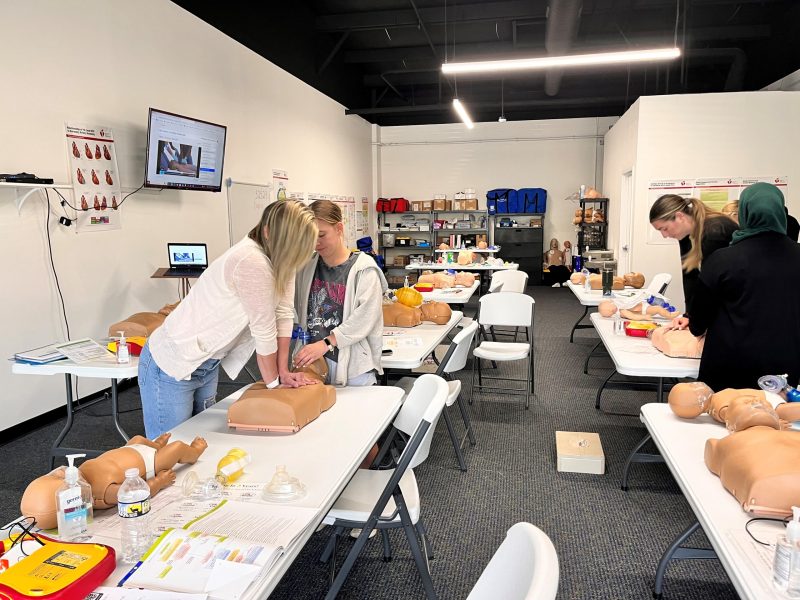What is BLS Certification?
Call Us Now
Get the Best CPR Class in St. Louis Today!
Basic Life Support (BLS) certification is a fundamental credential for anyone involved in healthcare and emergency response. This certification equips individuals with the essential skills required to respond effectively in life-threatening situations, such as cardiac arrest, respiratory distress, or airway obstruction. BLS certification is crucial not only for healthcare professionals but also for first responders and other occupations that might encounter emergency scenarios. Understanding what BLS certification entails and its significance can empower more individuals to be prepared to act decisively in emergencies.
Definition of BLS
BLS stands for Basic Life Support, a set of medical procedures and skills designed to provide initial care to patients experiencing life-threatening conditions. The core components of BLS include Cardiopulmonary Resuscitation (CPR), the use of Automated External Defibrillators (AEDs), and techniques for relieving choking. Additionally, BLS training emphasizes the importance of scene safety and patient assessment to ensure that responders can act swiftly and effectively without compromising their safety or the safety of others.
Who Needs BLS Certification
BLS certification is essential for a wide range of professionals. Healthcare providers, including doctors, nurses, and paramedics, are required to maintain BLS certification as part of their professional qualifications. First responders, such as firefighters, police officers, and emergency medical technicians (EMTs), also need BLS certification to perform their duties effectively. Beyond these roles, certain occupations, such as lifeguards, athletic trainers, and even teachers, may benefit from BLS certification due to the potential for encountering medical emergencies in their work environments.
Key Skills Covered in BLS Certification
Call Us Now
Get the Best CPR Class in St. Louis Today!
The skills covered in BLS certification are comprehensive and lifesaving. One of the primary skills is CPR, which involves chest compressions and rescue breaths to maintain circulation and oxygenation in a person who has stopped breathing or whose heart has ceased to function. The use of an AED, which can analyze the heart’s rhythm and deliver a shock if necessary, is another critical component of BLS training. Techniques for choking relief, including the Heimlich maneuver and back blows, are also taught. Additionally, BLS training covers the assessment of scene safety, which ensures that the responder and the patient are not exposed to further danger.
BLS Certification Process
The BLS certification process involves various training methods to accommodate different learning preferences and schedules. Traditional in-person courses offer hands-on practice and direct interaction with instructors, providing a comprehensive learning experience. Online courses offer flexibility, allowing individuals to complete the theoretical components at their own pace before attending an in-person skills assessment. Blended courses combine online learning with in-person sessions, offering a balanced approach. The duration of BLS courses can vary but typically ranges from a few hours to a full day, depending on the depth of the training and the provider’s requirements. To obtain certification, individuals must pass an exam that tests both their knowledge and practical skills.
Certification Validity and Renewal
BLS certification is not a one-time requirement; it has a validity period, usually two years. After this period, professionals must renew their certification to ensure their skills remain up-to-date with the latest guidelines and techniques. The renewal process often involves a refresher course and a re-certification exam. Keeping BLS certification current is crucial for maintaining competency and readiness to respond to emergencies.
Differences Between BLS and Other Life Support Certifications
While BLS certification is fundamental, it differs from other life support certifications like Advanced Cardiovascular Life Support (ACLS) and Pediatric Advanced Life Support (PALS). ACLS certification builds on BLS skills by incorporating advanced interventions such as drug administration, advanced airway management, and ECG interpretation, primarily for treating adult patients with severe cardiovascular conditions. PALS certification focuses on the specific needs of pediatric patients, teaching advanced techniques for managing critically ill infants and children. Both ACLS and PALS require prior BLS certification as a prerequisite.
Benefits of BLS Certification
The benefits of obtaining BLS certification extend beyond compliance with professional requirements. For healthcare professionals, BLS certification can enhance career advancement opportunities, demonstrating a commitment to patient safety and professional development. In emergencies, having BLS certification increases confidence, enabling individuals to perform life-saving procedures effectively. The ability to provide immediate care can significantly improve patient outcomes, potentially saving lives and reducing the severity of medical emergencies.
Conclusion
In conclusion, BLS certification is a vital credential for healthcare professionals and anyone interested in learning life-saving skills. It equips individuals with the knowledge and techniques necessary to respond effectively in cardiac and respiratory emergencies.
For those seeking high-quality CPR certification in St. Louis or BLS certification in St. Louis, CPR St. Louis is the premier choice. As an American Heart Association training site, they offer comprehensive, hands-on courses for both initial certifications and renewals. Their offerings include BLS for Healthcare Providers, ACLS, PALS, and CPR and First Aid courses.
Don’t delay in acquiring these crucial skills. Enroll in a course at CPR St. Louis today and gain the confidence to handle emergencies effectively. With their stress-free environment and expert instruction, you’ll receive the best CPR training in St. Louis. Take action now to become a potential lifesaver – sign up for a class at CPR St. Louis and invest in skills that could make a real difference when it matters most!







